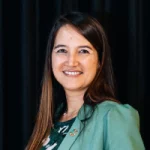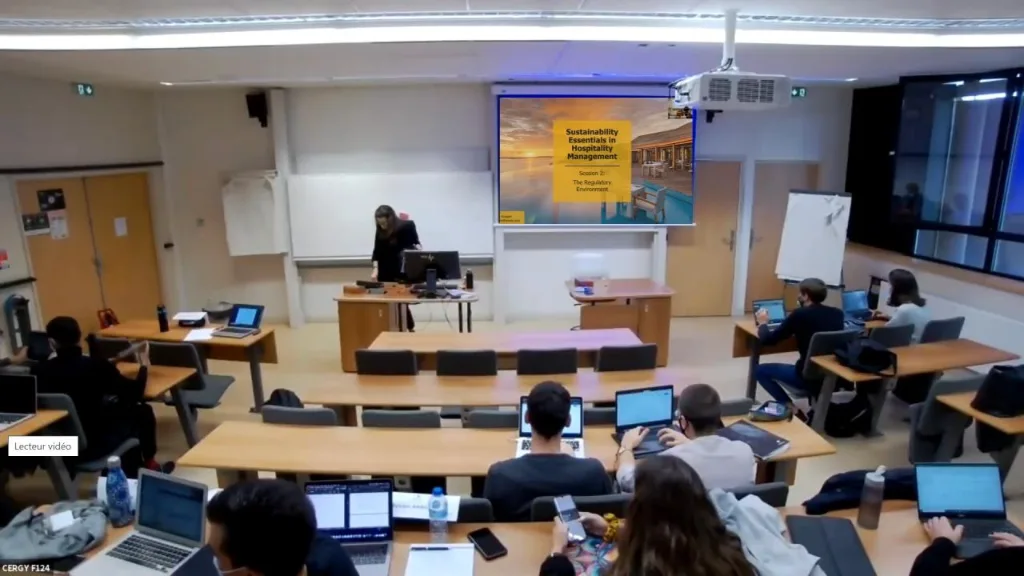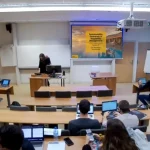Teacher: Carina Hopper, Johanna Wagner

Carina Hopper
Carina has taught sustainability in fashion and sustainable hospitality management at Business Schools including ESSEC Business School, SKEMA Business School and ESMOD Fashion Business School. She is a co-founder of Back to School for the Planet and Joined EDuC, which initiated the EDuC Label, the first sustainability accreditation for higher education programs which focuses on teaching and the student learning experience. With Johanna, she is the co-author of the literature review Assessing the Impact of ESD: Methods, Challenges, Results (Sustainability 2021, 13(5), 2854; https://doi.org/10.3390/su13052854).

Johanna Wagner
Johanna has taught on leading European hospitality management master’s programs since 2017. She moved from working in finance and asset management positions within hospitality organisations to teaching and facilitating sustainability learning for students and professionals. As co-founder of the non-profit Back to School for the Planet and impact-first company Join EDuC, she aims to foster sustainability integration in higher education and companies by designing new learning experiences. Johanna co-authored several publications to disseminate her initiatives, including a book chapter about BTSP in Transforming Business Education for a Sustainable Future (Routledge, 2023).
Usefull links related to the Solution
Overview
The project seeks to solve the lack of green skills among today’s professionals and leaders who graduated many years ago from higher education programs which did not integrate sustainability into the curriculum. This initiative aims to equip professionals and leaders with the green skills they are often lacking by opening current sustainability classes taught in universities to alumni. The project began because Johanna noticed that professionals often have a strong interest in sustainability but do not know how to integrate it into their professional practices nor who to ask and where to get the relevant training as sustainability is a relatively new focus area and is often out of their current field of expertise.
Theory of Change
The project seeks to solve the lack of green skills among today’s professionals and leaders. The solution is to open classrooms to higher education alumni, inviting them to return to the school they graduated from to follow newly-introduced sustainability courses alongside current students. This solution builds on the existing trust relationship that exists between alumni and the institution they graduated from, overcoming a common barrier that prevents professionals from signing up for training on sustainability. These alumni classes will lead to more professionals having the knowledge and skills to make responsible decisions for a better future.
Approach and Actions
Johanna, Carina and the project team piloted the Back to School for the Planet Alumni Initiative, by opening four alumni places each in two new 25-hour courses on sustainability. They partnered with the Alumni Association to promote the initiative to its 1400+ members by email and on a private Linkedin group. They received 16 applications from alumni from a variety of countries and age groups. The eight accepted alumni were invited to attend all 25 hours of their assigned course alongside current students.
The team asked the alumni to sign an Alumni Code of Conduct and organised a dedicated 45-minute kickoff and Q&A session with them prior to the start of the course. This allowed the team to set clear participation rules and make sure that the alumni were committing to follow the whole course and submit similar assignments as the other students.
During the sessions, the team observed that the graduates were highly engaged, both in asking questions and in sharing relevant corporate experience, while the students were in turn stimulated by the presence of alumni and their active contribution to the discussions.
Impact
Out of the eight participating alumni, five answered an impact survey six months after completing the sustainability course and unanimously agreed that the experience of returning to their former classrooms to learn about sustainability was transformative and had positive impacts both on their personal and professional lives.
Following the success of the pilot, Back to School for the Planet was registered as a non-profit association in January 2021 with the aim of encouraging and supporting this good practice in as many universities as possible.
The project’s wider implications are that it drives interest from current students in sustainability courses and amplifies the positive impact of higher education institutions beyond their current students.

